Kipras Petrauskas used the name Kiprian Piotrovskij in Russia, also on records.
Petrauskas was born on November 23rd (December 5th), 1885 in Ceikiniai in East Lithuania.
He was born into a musician family. His father was an organist and singer (tenor), his mother sang in the church choir. He first
learned music from his brother, the composer and singer Mikas Petrauskas (1873–1937).
Together with his brother, he took part in the revolutionary movement of 1905–07, for which he repeatedly suffered
repressions.
On October 24th, 1906, Petrauskas made his debut in Vilnius, as Birutė's Brother in the premiere of the first Lithuanian opera
Birutė, composed by his own brother Mikas.
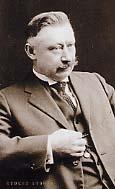 |
| Mikas Petrauskas |
From 1907 to 1911, he studied singing at the St. Petersburg conservatory with Stanislav Gabel,
and stagecraft with Josef Paleček.
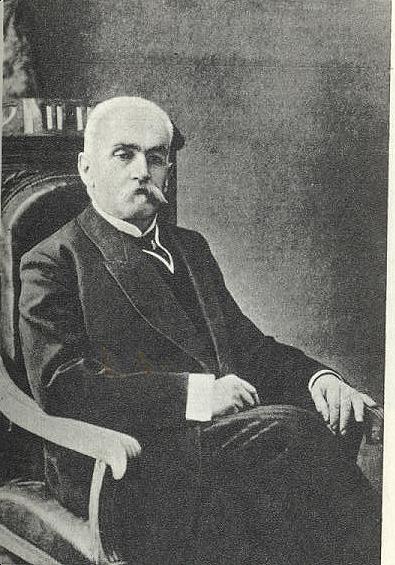 | 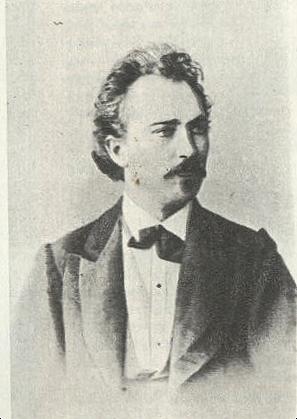 |
| Stanislav Gabel | Josef Paleček |
During his conservatory days, Petrauskas sang in student performances of Majskaja noch, Die lustigen Weiber von Windsor, Faust,
and Evgenij Onegin (Triquet). He also took part in a performance of Le desert by David in a concert at the palace of count
Sheremetev (28 March 1910), and at concerts with the pianist and conductor Aleksandr Ziloti.
Later he went to Rome for further studies with Enrico Rosati.
In March 1911, Petraukas made his debut as Roméo at the Bolshoj (he sang the role there again in 1914).
The same year, he made his debut (under the pseudonym Piotrovskij) as Duca at the Mariinskij (6 September, with
Tartakov, L. Lipovskaja, E. Zbrueva, and S. Preobrazhenskij). He sang there until 1920, performing
Alfredo, Faust, Lenskij, Almaviva, Pinkerton, Gérald, Roméo, Werther,
Paolo ("Francesca da Rimini" by Nápravnik), Jontek, Rodolfo, Bajan, des Grieux ("Manon") and Levko.
Fjodor Shaljapin valued him highly (this our ascending star), and prepared Faust and Mozart (in Mozart i Salieri) with him. They
sang those operas together at the Malij in St. Petersburg.
In summer of 1920, Petrauskas performed at the spectacular Moscow garden theatre Hermitage.
In 1920, he returned to Lithuania, where he was one of the founders (together with J. Naujalis and J. Tallat-Kelpša)
of the Lithuanian National Opera, then based in Kaunas.
In the opening performance on December 31st, 1920, he sang Alfredo. He was to sing for the company (which moved to Vilnius after
WWII) until 1957.
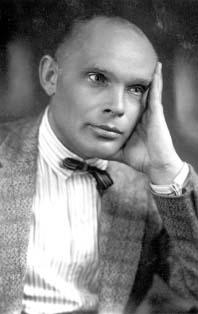 |
| Juozas Tallat-Kelpša, conductor and composer |
He toured Germany (Berlin in 1925 and 1928 with Shaljapin in Faust; Leipzig in 1928, in Faust as well), France (Paris
1929–1931, singing Gvidon, Berendej, Levko and Vladimir Igorevich with
the Opéra Russe), Vichy (1931/32, Zolotoj petushok and Snegurochka),
Sweden (Stockholm), Italy (Rome, Milan in 1933 as Kuterma with Oda Slobodskaja),
Madrid/Vienna/Prague/Brussels (with the Opéra Russe), Argentina (Buenos Aires) and the USA (concerts
for Lithuanian emigrants).
Petrauskas was living – with his wife Elena Žalinkevičaite-Petrauskienė, a well-kown actress and poet and
much his junior – in Kaunas during the years of the German occupation.
In spring 1942,
Petrauskas was asked to provide shelter for the six-month-old
Dana Pomeranz, the daughter of the violinist Daniel Pomeranz, a famous musician in pre-war Lithuania.
Petrauskas and his wife agreed, and the baby girl was smuggled from the Vilnius ghetto
and brought to Petrauskas' home. Since the Petrauskas family was rather famous in Lithuania and many people were
interested in their private life, giving shelter to a Jewish baby was enormously risky for them. So after a short while, they
chose to leave the city and move to a village with the Jewish baby and their own three children. In 1944, they moved on to
Austria and later to Germany. Throughout all that time, Petrauskas and his wife treated little Dana with warmth and devotion. In
1947, they returned to Lithuania, located Dana's parents and returned their daughter to them safe and sound. Dana remained
in close touch with her rescuers, regarding them as a second set of parents. Like her biological father, Dana Pomeranz-Mazurkevich
became a violinist.
For this heroic rescue, Kipras Petrauskas and Elena Žalinkevičaite were posthumously awarded the title Righteous
among the Nations by the Yad Vashem Holocaust Memorial in 1999. Incredibly, the Lithuanian Wikipedia, in its long entry about
Petrauskas, doesn't say a single word about the whole Dana Pomeranz story (as of October 2021). Another sad example that
Lithuania is today totally incapable of coming to terms with its short but incomparably violent Nazi past. Vilnius had one of the
largest Nazi ghettos anywhere, and of the Jewish population of Lithuania, which counted (including refugees from Nazi-controlled
countries) 265,000 people before the 1941 Nazi invasion, only 11,000 were still alive when the Nazis had to leave three years
later. Which means that 95 percent of the Jews in Lithuania were killed, more than anywhere else under the Nazi reign, and with
the avid participation of Lithuanian Nazi supporters. Don't expect those horrible events to be present in any form in modern
Lithuania; hardly anything reminds of the Vilnius ghetto (which was in the very center of the city), nothing at all reminds of the
fact that one third (!) of the inhabitants of Vilnius had been Jewish before the Nazis arrived. Lithuania's fixation on the
Soviet occupation, the Soviet terror, the Soviet atrocities totally obscures the much shorter but even more violent Nazi episode
in the country's history (the Nazis killed a shade more people in Lithuania in just three years than the Soviets did in 47), and
the Lithuanian Wikipedia article on Petrauskas is perfectly in line with that rather weird mindset.
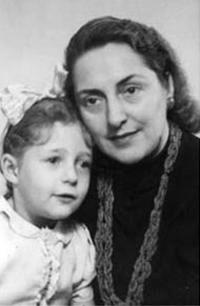 |
| Elena Žalinkevičaite with Dana Pomeranz |
After the war Petrauskas could not leave the country because of the Soviet rule. The Lithuanian Wikipedia
also portrays him as a rather fervent communist, so perhaps he didn't intend to leave, either.
From 1949, he taught at the Vilnius conservatory,
among his students were Valentinas Adamkevičius, Leonid Murashko and
Virgilijus Noreika.
He performed the last time in 1957 as José and died on January 1st, 1968 in Vilnius.
His repertory included, other than the roles already listed above:
Orfeo (Orfeo ed Euridice), Grigorij Melekhov (Tikhij Don by Dzerzhinskij),
Grigorij, Sinodal, Vagoa (Judif/Judith by Serov),
German, Young gypsy (Čigonai/Gypsies by Galkauskas),
Erekle (Izmena by Ippolitov-Ivanov), Orphée (Orphée aux enfers),
Samson, Otello, Radamès, Faust (Mefistofele), Wilhelm Meister,
Cavaradossi, Canio, Lohengrin, Éléazar, Riccardo, Manrico, Turiddu,
Andrea Chénier, Pedro (Tiefland),
Tannhäuser, Grenicheux (Les cloches de Corneville), Barinkay, Hoffmann, Fra Diavolo, Raoul, Julien, Piquillo (La
Périchole), Kuan-on (Megaië by Adam Wieniawski), Liutauras (Gražina by Jurgis Karnavičius),
Jonušas (Radvila Perkūnas by Karnavičius), Žilvinas (Eglė by Mikas Petrauskas).
Reference 1: Arkadij Pruzhanskij, Otechestvennye pevtsy 1750–1917, vol. 1, Moscow 1991
Reference 2
Reference 3